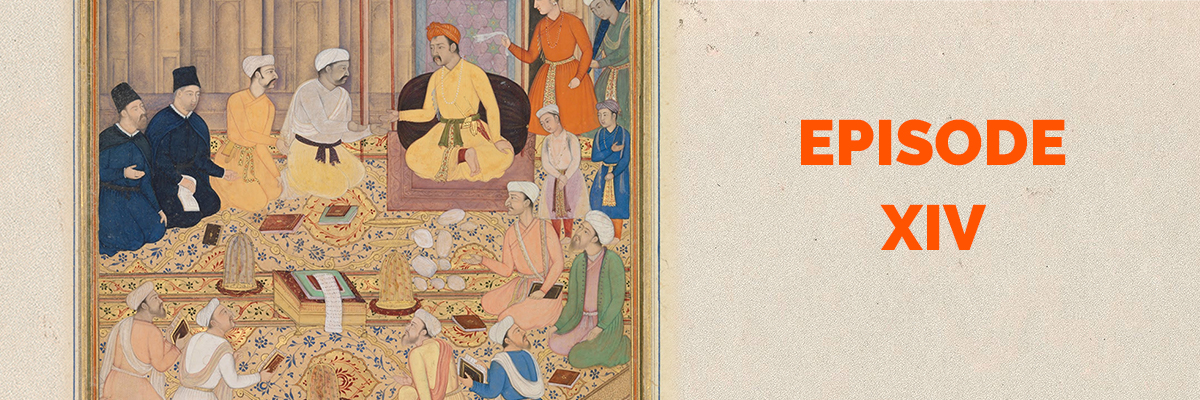Episode 14 leaves the West and heads to 16th and 17th Century India and the Mughal empire. In particular, the rule of Akbar the Great.
A century before John Locke’s “A Letter Concerning Toleration,” Akbar developed a policy of “Universal Peace” repudiating religious compulsion and embracing ecumenical debate. We’ll also discover why the history of the Mughal empire still tests the limits of free speech and tolerance in modern India. Among the questions tackled are:
- Why, how, and to what extent did Akbar abandon orthodox Islam for religious tolerance?
- How did religious tolerance in the Mughal empire compare to contemporary Europe?
- How did English travelers get away with openly blaspheming Muhammad, the Quran, and Allah?
- Was the emperor Aurangzeb really the uniquely intolerant villain that history has portrayed him as?
- Why do India’s current laws against religious insults hamper modern historians’ efforts at documenting events during the Mughal empire?
You can subscribe and listen to Clear and Present Danger on Apple Podcasts, Google Play, YouTube, TuneIn, and Stitcher, or download episodes directly from SoundCloud.
Stay up to date with Clear and Present Danger on the show’s Facebook and Twitter pages.
Email us feedback at freespeechhistory@gmail.com.
Literature: Episode 14
- Beveridge, A.S. (1922): The Babur-nama in English (memoirs of Babur) – Translated from the original Turki Text by Zahiru’d-din Muhammad Babur Padshah Ghazi. London, UK: Luzac & Co.
- Chandra, S. (1992): “Akbar’s Concept of Sulh-Kul, Tulsi’s Concept of Maryada and Dadu’s Concept of Nipakh: A Comparative Study” in: Social Scientist 20 (9/10) (Sep. – Oct., 1992), pp. 31-37.
- Fernée, T.G. (2014): Enlightenment and Violence: Modernity and Nation-Making. SAGE Publications.
- Hadi, N. (1960): “’Universal Peace’ (Sulh-i-Kul) and the Role of the Mughal Poets” in: Proceedings of the Indian History Congress 23 pp. 256–57.
- Koch, E. (2002): “The Intellectual and Artistic Climate at Akbar’s Court” in Seyller, J.W. (ed.): The adventures of Hamza: Painting and Storytelling in Mughal India. Freer Gallery of Art.
- Koch, E. (2012): “How the Mughal padshahs referenced Iran in their visual construction of universal rule” in Bang, P.F. & Kołodziejczyk, D. (eds.): Universal Empire. Cambridge University Press.
- Richards, J.F. (1996): The Mughal Empire (The New Cambridge History of India). Cambridge University Press.
- Sapra, R. (2003): “A Peaceable Kingdom in the East: Favourable Early Seventeenth-Century Representations of the Moghul Empire” in: Renaissance and Reformation / Renaissance et Réforme, New Series / Nouvelle Série, 27(3) (sumer 2003), pp. 5-36.
- Truschke, A. (2017): Aurangzeb: The Life and Legacy of India’s Most Controversial King. Stanford University Press.
- Wink, A. (2009): Akbar. Oxford, UK: Oxford One World.
Online literature and podcasts
- Audit Bureau of Circulations (ABC-India) (8 May 2017): Print Media is Growing [press release]. Accessible at http://www.auditbureau.org/news/view/53.
- Freedom House (2017): Freedom of the Press 2017: India. Accessible at https://freedomhouse.org/report/freedom-press/2017/india.
- Gettleman, J. (6 September 2018): India Gay Sex Ban Is Struck Down. ‘Indefensible,’ Court Says. The New York Times. Accessible at https://www.nytimes.com/2018/09/06/world/asia/india-gay-sex-377.html.
- Gowen, A. (7 September 2018) The shadowy extremist sect accused of plotting to kill intellectuals in India. The Washington Post. Accessible at https://www.washingtonpost.com/world/asia_pacific/the-shadowy-extremist-sect-accused-of-plotting-to-kill-intellectuals-in-india/2018/09/06/d7f78514-a66a-11e8-ad6f-080770dcddc2_story.html?utm_term=.151ecde6cadc.
- Hedge, S. (7 Septebmer 2018). Is Punjab’s proposed blasphemy law retrograde? The Hindu. Accessible at: https://www.thehindu.com/todays-paper/tp-opinion/is-punjabs-proposed-blasphemy-law-retrograde/article24887231.ece.
- India.gov.in: Constitution of India. Accessible at: https://www.india.gov.in/my-government/constitution-india/constitution-india-full-text.
- Library of Congress (10 April 2017): State Anti-conversion Laws in India. Accessible at https://www.loc.gov/law/help/anti-conversion-laws/india.php.
- Press Trust of India (2 January 2015): Case lodged against ‘PK’ actor Aamir Khan, director Raju Hirani and producer in Rajasthan. The Indian Express. Accessible at: https://indianexpress.com/article/entertainment/bollywood/case-lodged-against-pk-actor-aamir-khan-director-raju-hirani-and-producer-in-rajasthan/.
- Truschke, A. (27 July 2017): Censoring Indian History: Laws against religious offence in India have altered the writing and understanding of the nation’s past. History Today. Accessible at: https://www.historytoday.com/audrey-truschke/censoring-indian-history.
- BBC Radio 4 – In Our Time: The Mughal Empire. Accessible at: https://www.bbc.co.uk/programmes/p004y27h.
